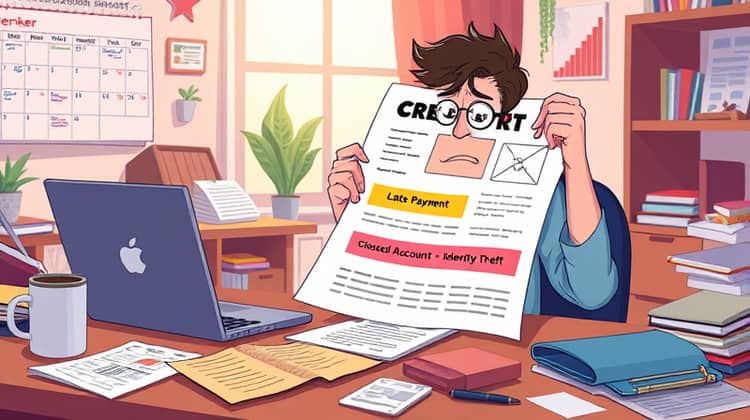Credit Report Errors: How to Effectively Dispute and Correct Them

Credit report errors are more common than many people realize, and they can have significant implications for your financial health. Misreported information can affect your credit score, leading to higher interest rates or even denials for loans and credit. Understanding how to identify, dispute, and correct these errors is essential for maintaining a good credit standing.
This article will provide a thorough overview of credit report errors, including how to spot them, common types of errors, and the critical steps you need to take to ensure your credit report accurately reflects your financial history. Understanding the process of disputing credit report errors can empower you to take control of your financial future.
Understanding Credit Report Errors

A credit report is a detailed record of your credit history compiled by credit bureaus. It includes information about your debts, payment history, credit inquiries, and public records. This information is used by lenders to evaluate your creditworthiness, which directly affects your ability to obtain loans and credit cards.
Unfortunately, errors can occur on your credit report, leading to incorrect assumptions about your credit profile. These errors might stem from clerical mistakes, outdated information, or identity fraud. It's crucial to regularly check your credit report to identify and dispute any inaccuracies.
- Incorrect personal information (name, address, etc.)
- Accounts that do not belong to you
- Incorrect account statuses (e.g., reported as late when paid on time)
- Duplicated accounts or credit inquiries
- Outdated information that should have been removed
Once you identify potential errors, it's important to understand them fully before pursuing a dispute. Knowing what your rights are and how to proceed will set the groundwork for a successful resolution.
Common Credit Report Errors

Certain types of errors are commonly found on credit reports and can have varying impacts on your credit score. Being aware of these common issues can help you identify them quickly.
- Late payments inaccurately reported
- Closed accounts still listed as open
- Balance discrepancies on revolving accounts
- Identity theft resulting in accounts under your name
- Inaccurate or missing account details
Recognizing these common errors is the first step in ensuring your credit report reflects an accurate and fair representation of your creditworthiness.
The Importance of Correcting Errors

Correcting errors on your credit report is not merely a matter of preference; it is crucial for your financial well-being. An inaccurate credit report can lead to denied applications for loans or credit, or worse, receiving offers with unfavorable terms due to erroneous credit scores.
Moreover, in today's fast-paced financial environment, having a high credit score can save you thousands of dollars on interest fees over the life of a loan. With the financial stakes being so high, consumers need to take their credit reports seriously and act swiftly upon noticing discrepancies.
Even minor errors can have a significant impact on your score and your ability to get favorable rates. Therefore, taking the initiative to correct any misinformation can directly affect your financial future.
In addition, being proactive about monitoring and correcting your credit report shows lenders that you are responsible, which can further enhance your creditworthiness.
How to Dispute Credit Report Errors

Disputing a credit report error may seem daunting, but understanding the steps involved can simplify the process. Here is a breakdown of how you can effectively dispute inaccuracies on your credit report.
Before engaging in the dispute process, it’s beneficial to gather all the necessary documentation that supports your claim. Being organized will facilitate a smoother dispute process.
1. Gather Necessary Information
Start by collecting all relevant documents that pertain to the credit report error you've identified. This may include bank statements, credit card statements, and any correspondence with creditors.
Having this information on hand can help substantiate your claims while discussing errors with credit bureaus or creditors.
- Copy of your credit report showing the error
- Payment records for the account in question
- Communication with the creditor about the error
- Identification documents to establish identity
Keeping track of this documentation will be valuable when you initiate the dispute process, ensuring that you present a strong case for correcting the errors.
2. Contact the Credit Bureau
With your documentation in hand, the next step is to contact the credit bureau that reported the incorrect information. You can do this through their website, by mail, or by phone, depending on your preference.
When filing a dispute, ensure that you provide your identification information and a clear summary of the error, along with any supporting documents. Depending on the bureau, they typically have a specific process for handling disputes.
3. Contact the Information Provider
In addition to notifying the credit bureau, it’s essential to reach out to the provider of the incorrect information. This could be a lender or creditor.
By contacting the information provider directly, you can request that they correct the information they reported. Provide them with the same evidence that you shared with the bureau, as it can help expedite the resolution process.
4. Review the Results of the Investigation
Once your dispute is filed, the credit bureau will conduct an investigation, typically within 30 days. They will review the information you provided alongside the claim from the information provider.
After the investigation is complete, the bureau will send you the results along with a free copy of your credit report if the dispute leads to a change in your report.
Take the time to review the findings and ensure that any identified errors have been corrected. If the bureau rules in your favor, it will update your report accordingly.
5. Add a Statement of Dispute
If your dispute is not resolved in your favor, you have the right to add a statement of dispute to your credit report. This statement can provide context regarding the dispute and any additional information regarding the error.
To add a statement, contact the credit bureau and clearly articulate your reasons for the dispute, along with any relevant explanations or evidence supporting your stance.
6. Monitor Your Credit Reports
Correcting errors is just part of maintaining your financial health. Once you’ve gone through the dispute process, it’s crucial to set a schedule for regularly checking your credit reports.
By monitoring your credit reports, you can immediately identify and address any future errors or discrepancies that arise, ensuring an accurate assessment of your credit profile.
Tips for a Successful Dispute

In order to make your dispute process as effective as possible, several strategies can increase your chances of success. Primarily, thorough preparation can make all the difference.
Being patient and persistent is also essential during the dispute process. Keep in mind that resolving credit report errors can take some time.
- Stay organized with your documents and correspondence.
- Be clear and concise about the errors and your request for correction.
- Follow up consistently with both the credit bureau and the information provider for updates.
By applying these tips, you will be in a stronger position to successfully dispute errors on your credit report.
Legal Protections and Rights

Consumers have rights when it comes to credit reports, as outlined in the Fair Credit Reporting Act (FCRA). Under this law, you are entitled to receive an accurate credit report, free from errors and inaccuracies.
If you find errors, credit bureaus are legally obligated to investigate your claims and rectify any inaccuracies within a reasonable time frame.
Understanding your rights can provide you additional leverage when disputing errors, ensuring that your request for correction is taken seriously.
Conclusion

Credit report errors can have profound effects on your financial standing, making it vital to understand how to dispute and correct them effectively. By staying informed and proactive, you can safeguard your credit health and improve your financial opportunities.
Whether you're preparing to purchase a home or apply for a new credit card, ensuring that your credit report is accurate prepares you for future financial success.






